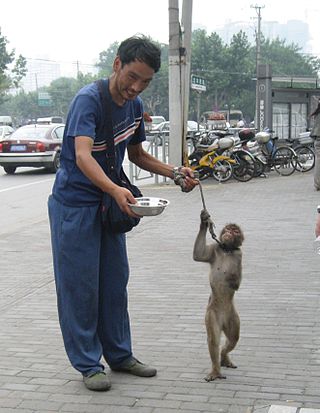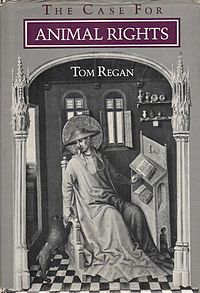
Peter Albert David Singer is an Australian moral philosopher and the Ira W. DeCamp Professor of Bioethics at Princeton University. He specialises in applied ethics, approaching the subject from a secular, utilitarian perspective. He wrote the book Animal Liberation (1975), in which he argues for vegetarianism, and the essay "Famine, Affluence, and Morality", which favours donating to help the global poor. For most of his career, he was a preference utilitarian, but he revealed in The Point of View of the Universe (2014), coauthored with Katarzyna de Lazari-Radek, that he had become a hedonistic utilitarian.

Speciesism is a term used in philosophy regarding the treatment of individuals of different species. The term has several different definitions within the relevant literature. Some sources specifically define speciesism as discrimination or unjustified treatment based on an individual's species membership, while other sources define it as differential treatment without regard to whether the treatment is justified or not. Richard Ryder, who coined the term, defined it as "a prejudice or attitude of bias in favour of the interests of members of one's own species and against those of members of other species." Speciesism results in the belief that humans have the right to use non-human animals, which scholars say is pervasive in the modern society. Studies from 2015 and 2019 suggest that people who support animal exploitation also tend to endorse racist, sexist, and other prejudicial views, which furthers the beliefs in human supremacy and group dominance to justify systems of inequality and oppression.
In ethical philosophy, utilitarianism is a family of normative ethical theories that prescribe actions that maximize happiness and well-being for all affected individuals.

Martha Craven Nussbaum is an American philosopher and the current Ernst Freund Distinguished Service Professor of Law and Ethics at the University of Chicago, where she is jointly appointed in the law school and the philosophy department. She has a particular interest in ancient Greek and Roman philosophy, political philosophy, existentialism, feminism, and ethics, including animal rights. She also holds associate appointments in classics, divinity, and political science, is a member of the Committee on Southern Asian Studies, and a board member of the Human Rights Program. She previously taught at Harvard and Brown.

Richard Hood Jack Dudley Ryder is an English writer, psychologist, and animal rights advocate.
David Sztybel is a Canadian philosopher specializing in animal ethics.

Animal rights is the philosophy according to which many or all sentient animals have moral worth independent of their utility to humans, and that their most basic interests—such as avoiding suffering—should be afforded the same consideration as similar interests of human beings. Broadly speaking, and particularly in popular discourse, the term "animal rights" is often used synonymously with "animal protection" or "animal liberation". More narrowly, "animal rights" refers to the idea that many animals have fundamental rights to be treated with respect as individuals—rights to life, liberty, and freedom from torture that may not be overridden by considerations of aggregate welfare.
Animal ethics is a branch of ethics which examines human-animal relationships, the moral consideration of animals and how nonhuman animals ought to be treated. The subject matter includes animal rights, animal welfare, animal law, speciesism, animal cognition, wildlife conservation, wild animal suffering, the moral status of nonhuman animals, the concept of nonhuman personhood, human exceptionalism, the history of animal use, and theories of justice. Several different theoretical approaches have been proposed to examine this field, in accordance with the different theories currently defended in moral and political philosophy. There is no theory which is completely accepted due to the differing understandings of what is meant by the term ethics; however, there are theories that are more widely accepted by society such as animal rights and utilitarianism.

The Case for Animal Rights is a 1983 book by the American philosopher Tom Regan, in which the author argues that at least some kinds of non-human animals have moral rights because they are the "subjects-of-a-life," and that these rights adhere to them whether or not they are recognized. The work is considered an important text within animal rights theory.
The concept of moral rights for animals is believed to date as far back as Ancient India, particularly early Jainist and Hindu history. What follows is mainly the history of animal rights in the Western world. There is a rich history of animal protection in the ancient texts, lives, and stories of Eastern, African, and Indigenous peoples.
Several individuals and groups have drawn direct comparisons between animal cruelty and the Holocaust. The analogies began soon after the end of World War II, when literary figures, many of them Holocaust survivors, Jewish or both, began to draw parallels between the treatment of animals by humans and the treatments of prisoners in Nazi death camps. The Letter Writer, a 1968 short story by Isaac Bashevis Singer, is a literary work often cited as the seminal use of the analogy. The comparison has been criticized by organizations that campaign against antisemitism, including the Anti-Defamation League (ADL) and the United States Holocaust Memorial Museum, particularly since 2006, when PETA began to make heavy use of the analogy as part of campaigns for improved animal welfare.

British philosophy refers to the philosophical tradition of the British people. "The native characteristics of British philosophy are these: common sense, dislike of complication, a strong preference for the concrete over the abstract and a certain awkward honesty of method in which an occasional pearl of poetry is embedded".

Personism is an ethical philosophy of personhood as typified by the thought of the utilitarian philosopher Peter Singer. It amounts to a branch of secular humanism with an emphasis on certain rights-criteria. Personists believe that rights are conferred to the extent that a creature is a person. Michael Tooley provides the relevant definition of a person, saying it is a creature that is "capable of desiring to continue as a subject of experience and other mental states". A worldview like secular humanism is personism when the empathy and values are extended to the extent that the creature is a person.

Animals' Rights: Considered in Relation to Social Progress is an 1892 book by the English social reformer Henry Stephens Salt. It is widely considered to be the first explicit treatment of the concept of animal rights.

An Introduction to Animals and Political Theory is a 2010 textbook by the British political theorist Alasdair Cochrane. It is the first book in the publisher Palgrave Macmillan's Animal Ethics Series, edited by Andrew Linzey and Priscilla Cohn. Cochrane's book examines five schools of political theory—utilitarianism, liberalism, communitarianism, Marxism and feminism—and their respective relationships with questions concerning animal rights and the political status of (non-human) animals. Cochrane concludes that each tradition has something to offer to these issues, but ultimately presents his own account of interest-based animal rights as preferable to any. His account, though drawing from all examined traditions, builds primarily upon liberalism and utilitarianism.

Animal Rights Without Liberation: Applied Ethics and Human Obligations is a 2012 book by the British political theorist Alasdair Cochrane, in which it is argued that animal rights philosophy can be decoupled from animal liberation philosophy by the adoption of the interest-based rights approach. Cochrane, arguing that there is no reason that (nonhuman) animals should be excluded from justice, adopts Joseph Raz's account of interest rights and extends it to include animals. He argues that sentient animals possess a right not to be made to suffer and a right not to be killed, but not a right to freedom. The book's chapters apply Cochrane's account to a number of interactions between humans and animals; first animal experimentation, then animal agriculture, the genetic engineering of animals, the use of animals in entertainment and sport, the relationship of animals to environmental practices and the use of animals in cultural practices.

Gary Edward Varner was an American philosopher specializing in environmental ethics, philosophical questions related to animal rights and animal welfare, and R. M. Hare's two-level utilitarianism. At the time of his death, he was an emeritus professor in the department of philosophy at Texas A&M University; he had been based at the university since 1990. He was educated at Arizona State University, the University of Georgia, and the University of Wisconsin–Madison; at Madison, where he was supervised by Jon Morline, he wrote one of the first doctoral theses on environmental ethics. Varner's first monograph was In Nature's Interests?, which was published by Oxford University Press in 1998. In the book, Varner defended a form of biocentric individualism, according to which all living entities have morally considerable interests.

The predation problem or predation argument refers to the consideration of the harms experienced by animals due to predation as a moral problem, that humans may or may not have an obligation to work towards preventing. Discourse on this topic has, by and large, been held within the disciplines of animal and environmental ethics. The issue has particularly been discussed in relation to animal rights and wild animal suffering. Some critics have considered an obligation to prevent predation as untenable or absurd and have used the position as a reductio ad absurdum to reject the concept of animal rights altogether. Others have criticized any obligation implied by the animal rights position as environmentally harmful.
The replaceability argument, or the logic of the larder, is a philosophical argument that has been used to reject vegetarianism. It holds that consuming nonhuman animal products is good for animals because if they were not consumed, fewer animals would be brought into existence. The argument has particularly been engaged with within the context of utilitarianism.













